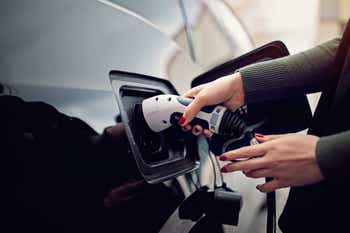Electric vehicle ownership offers a number of advantages over gas-powered cars, such as cheaper power, fewer moving parts and better performance. However, like all vehicles, EVs need routine maintenance to keep them operational.
“Even though EVs require less maintenance than conventional vehicles, they still require a level of servicing to ensure they run effectively,” said Kevin Quinn, vice president of auto claims at Mercury Insurance. “Conduct regular checks on your EVs electrical systems including the battery, electric motor, and tires. And just as you inspect your car as part of its regular maintenance, you should also check your auto policy routinely to make sure it’s updated to reflect the needs of your EV.”
Here are five recommendations that you can do right now to ensure your EV remains in good condition and operates smoothly and efficiently for years to come.
Check your tire pressure
The pressure of EV’s tires are important. Tires that are too low can cause unnecessary friction, reducing the range of a vehicle and shortening the lifespan of its battery. It is important to check tire pressure regularly, to ensure proper inflation according to the vehicle manufacturer’s recommendations. It is suggested to check tire pressure in the morning, when tires are typically at their coldest. You may also want to visually inspect your tires every 1-3 months for signs of damage or excessive wear. Have your tires rotated approximately every six months or as specified by your vehicle’s manufacturer.
Keep your vehicle charged
According to the J.D. Power 2022 U.S. Electric Vehicle Experience (EVX) Home Charging Study℠, 84% of EV owners regularly charge their vehicle at home. Many drivers find that keeping their battery’s state of charge between 30% and 80%, except when on long trips, is a good practice to follow. Overcharging or undercharging your battery often may reduce the battery’s capability over time.
Check your brake pads
In EVs, when you lift your foot off of the accelerator and onto the brake to slow down or stop the vehicle, the motor puts the energy from the driving function back into the battery. Because of this, the brake pads don’t wear as quickly as they might on a gas powered vehicle, but you still want to keep those brake pads maintained so they function properly.
Battery health
It’s recommended that EV drivers keep their batteries charged between 30% and 80% to slow the process of battery degradation. Frequent fast charging or excessive charging could cause the battery packs to break down quicker. If the car is not going to be used for a long amount of time, it’s recommended that EV owners store their vehicles with the charge closer to 50%.
Review Your Auto Insurance Policy
Regularly reviewing your insurance policy allows you to update your coverage, which makes it easier for you to file a claim in the unfortunate circumstance that you need to do so. Understanding what your insurance policy covers helps ensure you and your vehicle. Speak to your insurance agent to make sure your auto policy is up to date.


